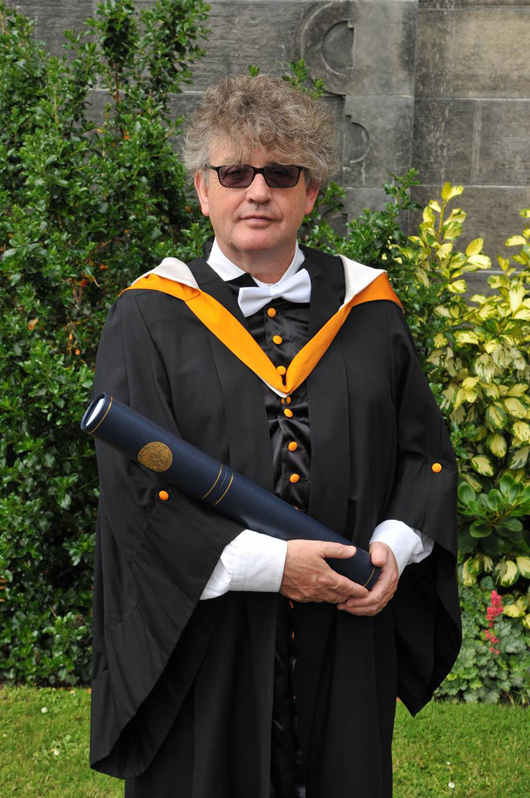Laureation Address – Professor Paul Muldoon
Professor Paul Muldoon
Honorary Degree of Doctor of Letters
Laureation by Professor Don Paterson
School of English
Wednesday 20 June 2012

Vice-Chancellor, it is my privilege to present for the Degree of Doctor of Letters, honoris causa, Professor Paul Muldoon.
Paul Muldoon was born in 1951 in County Armagh, Northern Ireland, and educated at Queen’s University, Belfast. Since 1987 he has lived in the United States, where he is now Howard GB Clark ’21 Professor at Princeton University, and Founding Chair of the Lewis Center for the Arts. He has held the post of Professor of Poetry at Oxford, and since 2007 has been poetry editor at The New Yorker.
The poet called Paul Muldoon seemed to spring fully-formed from the womb. His first collection, New Weather – published when he was still in his very early twenties – displayed a wholly original style: playful, yet serious; skeptical, yet open-hearted; knowing, yet open-minded, with each poem working its way to an often literally breathtaking conclusion. But what was most remarkable about these poems was the depth of their integration, the total interdependence of their parts, the way in which every word seemed attuned and alive to every other word.
Muldoon’s poetry often embraces the conditional mood as if it were a kind of credo; matters are pursued, but rarely settled. In its complexity and rich allusiveness, it has sometimes been described as ‘difficult’ – but Muldoon’s poetry reflects a life in which we can know nothing but the meaning we create for it. Meaning, in this work, often arrives in the form of profound and unsuspected connection. This project is continuous with his own remarkable technique: Muldoon has invented new kinds of metaphor; he has reinvigorated old forms; he has been the first poet for many decades to do anything genuinely original with rhyme – which he treats as a method of almost mystical interrogation, of drawing his own poetry from the shadows. All Muldoon’s formidable craft is placed in the service of a kind of ‘doctrine of signatures’, where shared motifs are revealed between two apparently disparate elements or unrelated events, throwing new and strange light on them both.
For all its artful obliquities, his work has never shied away from addressing difficult subjects, including The Troubles: indeed one might argue that his conditional stance reflects a principled refusal to be drawn into the premature judgment or caricature of an intractably complex situation. In these poems, Muldoon has made some of the wisest, most nuanced and subtle responses of all his compatriots.
Muldoon was an old master by the age of thirty; what, exactly, that makes the later Muldoon is hard to say, since the precedents for such high artistic accomplishment are few. Critics tend to reach too readily for Yeats, though it is the Joycean path that Muldoon has followed just as keenly. That is to say he does work on the language, not just within it. Muldoon is no mere experimentalist, however; his experiments are too successful. In showing new ways in which words can be turned, he has increased the expressive possibilities of our human speech. For that reason, Muldoon is quite simply one of the most influential poets of the age.
He has also distinguished himself as a critic – and one every bit as subversive and original as he is a poet. His Oxford lectures, collected as The End of the Poem, are joyous, brilliant performances, forming chains of association to link texts in ways we could not have suspected; typically, they also make us reexamine the very form of the academic lecture itself. In Muldoon’s hands, it is subjected to a kind of controlled explosion.
Given his immaculate ear, it is no surprise to discover that music has always played a large part in Paul’s life. As a librettist, he has collaborated with the composer Daron Hagen on several operas; he has written songs with the late Warren Zevon; and he is definitely the only Irish poet to have had a song recorded by Bruce Springsteen. He has also performed as a guitarist with his own band, Rackett, alongside other Princeton colleagues, playing music they have described as ‘three-car garage rock’.
Since this laureation could have been composed of a list of Muldoon’s awards and honours alone, I will mention only a few: he is a Fellow of the Royal Society of Literature, and a Member of the American Academy of Arts and Letters; his work has been the recipient of the T S Eliot Prize, the International Griffin Prize, the Shakespeare Prize, and the Pulitzer Prize for Poetry. We are extremely proud to add another honour to that long list.
Vice-Chancellor, in recognition of his remarkable contribution to the poetry of the English language, I invite you to confer on Professor Paul Muldoon the Degree of Doctor of Letters, honoris causa.
Category Awards